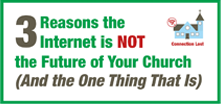20 years ago when people wanted to find a church they had to search the yellow pages or look through a newspaper for ads. Fast forward to now, and things are completely different. Now, when people want to find a church they start talking to their phone and ask it to find a church in their city. Results pop up, and they make a decision on whether or not they like your church before they even step through your front door.
Like it or not, your church has 2 front doors, and 2 back doors too. The first one that most people step through isn't attached to your building, it's attached to their computer, and if they don't like what they see, you'll never see them. Scary isn't it? People can make a judgment and decision on your church before they ever step foot in your building. before they experience your worship, shake someone hand, or get invited to join a small group.
Your website is the new front door to your church, and unless you are just as prepared to greet people at that door, they'll never make it to the real one.
Laurie Haller wrote a great article about the new front door that every church has, and some of the questions every church should ask. When the Grand Rapids District of the West Michigan Conference of United Methodist Churches decided to review the web presence of all 69 of their churches, they asked a set of questions, and got some startling answers. Their questions included:
• Does the church have a website?
• Do they have a Facebook presence that is evident on the web page?
• Do they have a Twitter presence that is evident on the web page?
• On what page does the church appear when “(city), Michigan churches” is Googled?
• Do they have a photo of the church on the home page, or is it just a click away?
• Do they have a “Welcome” or “I’m New” link for a visitor’s page?
• Is the home page information current and maintained properly?
• Are there written directions or a map on the home page, or is it just a click away?
• Is the worship service/style described on the home page, or is it just a click away?
• Do they offer sermons, podcasts or videos?
• Do they have an email address?
After searching for, and rating all 69 churches, here were their results:
• Out of a possible 16 points, two churches had 12 points. Not surprisingly, they were the two largest churches in the district.
• The next four churches had 10 points and were not necessarily ones we would have expected, except that three of the four were new church starts in the last 15 years.
• 25 of the 69 churches had no website that John could find.
• Two churches have a Twitter presence.
• 16 churches have a church photo on the home page or a click away.
• Nine churches have a Facebook presence.
• Nine churches have a visitor button or link.
• 11 churches have directions on the home page or a click away.
• Eight churches have either a sermon schedule, video of worship, or a description of worship on the home page or a click away.
• 10 churches offer sermons, texts, videos or podcasts.
• All but three churches have email.
• Only 12 websites have up-to-date information on the home page (one home page announced that “the Father and Son Banquet will be held on April 20, 2009”).
The article ends by asking a series of great questions that every church needs to wrestle with at least twice a year:
• How important is our website to the health and vitality of our church?
• What do we want to communicate to those who access our church website?
• If we want young families to be comfortable in our church, should we not devote a section of the website to infant and children’s ministries?
• Are we willing to invest as many resources in preparing guests to enter the virtual front door of the church as we do in welcoming guests when they enter the actual front door?
• Can we identify youth or other tech people to create simple, clear, and inviting websites, even for the smallest churches? It’s a great way to involve youth in the life of the church.
• Can we design our website so that the church secretary can update and maintain it?
• Can we create district pools of tech volunteers who can build websites for smaller churches without built-in expertise?
• If we are proud of our church, and our website is a tool for evangelism, why don’t we invite others to check out both front doors?
If I was visiting your city and wanted to go to church, would I find you online? If I did, would I want to go beyond your virtual front door to the real one?
Source: unitedmethodistreporter.com





